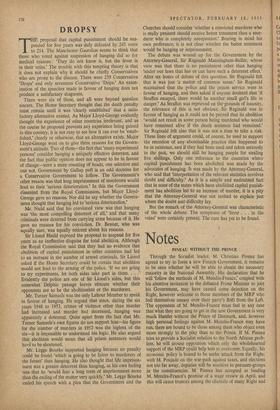DROPSY
THE proposal that capital punishment should be sus- pended for five years was duly defeated by 245 votes to 214. The Manchester Guardian seems to think that those who voted against suspension of hanging did so for medical reasons: 'They do not know it, but the fever is in their veins.' The trouble with this tempting theory is that it does not explain why it should be chiefly Conservatives who are prone to the disease. There were 239 Conservative 'Drops' and only seventeen Conservative 'Drips.' An exam- ination of the speeches made in favour of hanging does not produce a satisfactory diagnosis.
There were six of these, and all were beyond question sincere. The Home Secretary thought that the death penalty must remain until it was 'clearly established' that a satis- factory alternative existed. As Major Lloyd-George evidently thought the experience of other countries irrelevant, and as the course he proposed prevents any experience being gained in this country, it is not easy to see how it can ever be 'estab- lished,' clearly or otherwise, that an alternative exists. Major Lloyd-George went on to give three reasons for the Govern- ment's attitude. Two of them—the fact that 'many experienced persons' consider hanging a uniquely effective deterrent, and the fact that public opinion does not appear to be in favour of change—were a mere counting of heads, one selective and one not. Government by Gallup poll is an odd doctrine for a Conservative Government to follow. The Government's other reason was that long imprisonment of murderers would lead to their 'serious deterioration.' In this the Government dissented from the Royal Commission, but Major Lloyd- George gave no reasons. Nor did he say whether the Govern- ment thought that hanging led to 'serious deterioration.'
Mr. Nield said that his convinced view was that hanging was 'the most compelling deterrent -of all,' and that many criminals were deterred from carrying arms because of it. He gave no reasons for his conviction. Dr. Bennet, who was equally sure, was equally reticent about his reasons.
Sir Lionel Heald exposed the proposal to suspend for five years as an ineffective disguise for total abolition. Although the Royal Commission said that they had no evidence that abolition of capital punishment in other countries had led to an increase in the number of armed criminals, Sir Lionel asked if the Home Secretary could be certain that abolition would not lead to the arming of the police. 'If we are going to try experiments, let both sides take part in them. . . .' Evidently the police are one of Sir Lionel's sides, but this somewhat Delphic passage leaves obscure whether their opponents are to be the abolitionists or the murderers.
Mr. Turner Samuels was the only Labour Member to speak in favour of hanging. He argued that since, during the six years 1948 to 1953, crimes of violence other than murder had increased and murder had decreased, hanging was apparently a deterrent. Quite apart from the fact that Mr.
Turner Samuels's own figures do not support him—his figure for the number of murders in 1952 was the highest of the six—it is impossible to understand his logic. He also argued that abolition would mean that all prison sentences would have to be shortened.
Mr. Legge Bourke supported hanging because no penalty could be found 'which is going to be fairer to murderers of Churches should consider 'whether a convicted murderer who is really penitent should receive better treatment than a mur- derer who is completely unrepentant.' Bearing in mind his own preference, it is not clear whether the better treatment would be hanging or imprisonment.
The debate was wound up for the Government by the Attorney-General, Sir Reginald Manningham-Buller, whose view was that there is no punishment other than hanging `under our laws that has or can have such a deterrent effect.' After six hours of debate of this question, Sir Reginald felt that it was just 'a matter of common sense.' Sir Reginald maintained that the police and the prison service were in favour of hanging, and then asked if anyone doubted that 'if Straffen escaped, there would be another small girl's life in danger.' As Straffen was reprieved on the'grounds of insanity, the relevance of this is not obvious. Sir Reginald was in favour of hanging as it could not be proved that its abolition 'would not result in some person being murdered who would have remained alive if the death sentence had remained' Sir Reginald felt also that it was not a time to take a risk. These lines of argument could, of course, be used to support the retention of any abominable practice that happened to be in existence, and if they had been used and taken seriously in the past, we should still be hanging people for stealing five shillings. Only one reference to the countries where capital punishment has been abolished was made by the advocates of hanging. It was made by the Attorney-General, who said that 'interpretation of the relevant statistics involves doubt and difficulty.' As it is a simple and undoubted fact that in none of the states which have abolished capital punish- ment has abolition led to an increase of murder, it is a pity that the Attorney-General was not invited to explain just where the doubt and difficulty lay.
But the remark of the Attorney-General was characteristic of the whole debate. The symptoms of 'fever . . . in the veins' were certainly present. The cure has yet to be found.










































 Previous page
Previous page